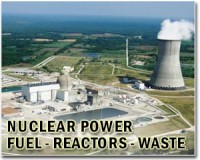 |
Stockholm, Sweden (UPI) Nov 16, 2010 Secrecy of the world's nuclear weapons programs remains a major governance and security issue that poses risks to world peace, conclusions of a new joint study by the Stockholm International Peace Research Institute and the Geneva Center for the Democratic Control of Armed Forces showed. "A clear and widespread deficit of democratic oversight and accountability exists across the entire nuclear weapon life cycle, even in open and democratic societies," SIPRI said in an introduction to the study. "Governing the Bomb," produced jointly by SIPRI and DCAF, was launched at the United Nations in Geneva, Switzerland. "While the management of most countries' nuclear arsenal has evolved to include a wider range of democratic mechanisms, secrecy prevails," said the study, which cites data collected in both industrial societies and developing countries with nuclear capability. Only greater oversight, transparency and accountability can pave the way for future non-use and disarmament of nuclear weapons, said SIPRI. The study looked into civilian control and democratic accountability for nuclear programs worldwide, surveying the structures and processes of nuclear weapon governance in eight nuclear-armed states -- the United States, Russia, Britain, France and China as well as Israel, India and Pakistan. "While the USA is the most advanced in terms of democratic oversight and accountability, it still keeps much secret and outside of oversight," said Bates Gill, SIPRI director and study co-editor. "In other democracies, such as India, Israel and Pakistan, nuclear weapon issues are highly guarded secrets, with the Israeli case being perhaps the most extreme of the three," said Gill. The study pointed out there was no clear link between regime type and good governance. "Whether a given nuclear weapon state is democratic, quasi-authoritarian or a dictatorship does not determine the decisions it will take regarding non-proliferation, disarmament or a potential use of its nuclear weapons," said the study. "The case studies show the need to look beyond 'who is pushing the button' and clarify the roles and responsibilities of all institutions and actors involved in nuclear weapon governance: the core security actors, the executive, the legislature, the judiciary and civil society." The study argued that good governance was the road to disarmament. "Our case studies indicate that greater oversight and accountability, when properly implemented through a system of checks and balances, lead to good governance of nuclear weapons -- that is, restrictions in the further development and proliferation of nuclear weapons as well as the promotion of their non-use and disarmament." For good governance to succeed, all nuclear-armed countries must engage a wider spectrum of democratic institutions -- legislature, judiciary and civil society -- in the process of nuclear weapon governance. "The future choice lies between a more open and democratic approach to governing nuclear weapons or ever-greater opacity, unaccountability and unpredictability," said the study.
Share This Article With Planet Earth
Related Links Nuclear Power News - Nuclear Science, Nuclear Technology Powering The World in the 21st Century at Energy-Daily.com
 South Korea bids for Lithuania nuclear project
South Korea bids for Lithuania nuclear projectSeoul (AFP) Nov 17, 2010 South Korea's state energy firm said Wednesday it was seeking to build a nuclear reactor in Lithuania, in the country's latest move to export its atomic expertise. Korea Electric Power Corp (KEPCO) has submitted a bid for the project at Visaginas and expects the preferred bidder to be announced next month, a spokesman said. He could not say how much the contract was worth or who else was ... read more |
|
| The content herein, unless otherwise known to be public domain, are Copyright 1995-2010 - SpaceDaily. AFP and UPI Wire Stories are copyright Agence France-Presse and United Press International. ESA Portal Reports are copyright European Space Agency. All NASA sourced material is public domain. Additional copyrights may apply in whole or part to other bona fide parties. Advertising does not imply endorsement,agreement or approval of any opinions, statements or information provided by SpaceDaily on any Web page published or hosted by SpaceDaily. Privacy Statement |